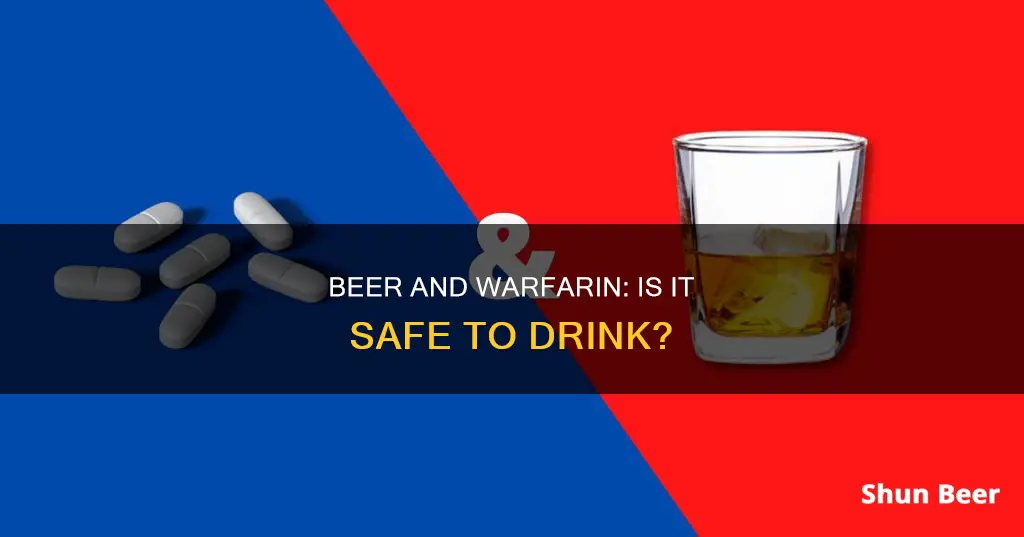
Drinking alcohol while on warfarin is not recommended by some healthcare providers, as it can cause you to bleed more easily. Warfarin is a commonly used blood thinner, and alcohol can slow down how quickly your body breaks it down, leading to a buildup of the drug in your system. This can increase the effects of warfarin and cause a greater risk of bleeding. If you do choose to drink while taking warfarin, it is recommended to limit your intake to one or two drinks occasionally and to get approval from your doctor first.
What You'll Learn

Warfarin and alcohol can cause bleeding
Drinking alcohol while taking warfarin can be dangerous. Warfarin is a commonly used blood thinner that can prevent and treat blood clots in the veins, arteries, or heart. It can also be used to stop existing clots from getting larger.
Alcohol can affect how warfarin works in the body. It slows down how quickly your body breaks down warfarin, which can lead to a buildup of the drug in your system. This buildup can increase the effects of warfarin and cause major bleeding. Warfarin interferes with the blood clotting process, and alcohol can also cause your body to make fewer platelets, which are the cells that start the blood clotting process. Therefore, drinking alcohol while taking warfarin can increase your risk of bleeding.
If you do choose to drink alcohol while taking warfarin, it is important to only drink occasionally, and limit yourself to one or two servings. Binge drinking or drinking large amounts of alcohol in a short period of time can be dangerous when combined with warfarin. It is also important to be consistent in the amount of alcohol you drink each day, avoiding big variations in the amount you drink from day to day.
Some healthcare providers recommend against drinking alcohol completely while taking warfarin. It is important to talk to your doctor about whether and how much alcohol you can drink while taking this medication.
Beer Drinking at San Angelo Rodeo: What's Allowed?
You may want to see also

Alcohol affects how warfarin works
The effect of alcohol on warfarin depends on various factors, including the type and amount of alcohol consumed, as well as individual factors such as age, gender, and medical history. It is recommended that those taking warfarin avoid drinking large amounts of alcohol and limit their consumption to occasional drinking, with no more than one to two drinks per day for men or one drink per day for women. Binge drinking or daily excessive alcohol consumption should be avoided.
It is important for individuals taking warfarin to consult their doctor about alcohol consumption. The doctor can help assess the individual's risk and provide guidance on safe drinking limits. Additionally, it is crucial to inform the prescriber if one drinks alcohol frequently, consumes large quantities, or has liver disease before starting treatment with warfarin. A dose adjustment may be necessary, along with testing of the prothrombin time or International Normalized Ratio (INR).
Some healthcare providers recommend completely refraining from alcohol while taking warfarin. It is essential to be aware of the potential risks and to understand where the benefits end and the risks begin. If one chooses to drink while taking warfarin, it is important to have this approved by a doctor and to monitor for any signs or symptoms that may indicate a problem, such as unusual bleeding or bruising, vomiting, blood in urine or stools, headache, dizziness, or weakness.
Old Beer: Drink or Dump?
You may want to see also

Drinking guidelines on warfarin
If you are taking warfarin, it is important to know how alcohol can affect you. Warfarin is a commonly used blood thinner that can prevent and treat blood clots in the veins, arteries, or heart. It can also be used to stop an existing clot from getting larger.
Alcohol can affect how warfarin works in your body. It slows down how quickly your body breaks down warfarin, which can lead to a buildup of the drug in your system. This buildup can increase the effects of warfarin and increase your risk of major bleeding. This risk is even greater if you have liver disease. Alcohol can also cause your body to make fewer platelets than normal, which are the cells that start the blood clotting process.
If you are taking warfarin, it is recommended that you avoid drinking large amounts of alcohol. However, moderate consumption of one to two drinks occasionally is unlikely to affect your response to warfarin if you have normal liver function. It is important to note that drinking guidelines suggest no more than 21 units of alcohol for a man or 15 units for a woman per week. One unit of alcohol equals half a pint of ordinary-strength pub beer, lager, or cider, or a single measure of spirit.
If you choose to drink while taking warfarin, it is important to have this approved by your doctor first. You should also be aware of the signs of bleeding and call your doctor right away if you experience any unusual bleeding or bruising, vomiting, blood in your urine or stools, headache, dizziness, or weakness.
Beer and Covid: What's Safe?
You may want to see also

Talk to your doctor about drinking on warfarin
Drinking alcohol while on warfarin can be dangerous, and it's important to talk to your doctor about the risks involved. Warfarin is a commonly used blood thinner that can prevent and treat blood clots in the veins, arteries, or heart. It is a popular drug for treating deep vein thrombosis (DVT) and can reduce the risk of a stroke, heart attack, or other serious conditions.
When considering drinking alcohol while taking warfarin, it is crucial to understand the potential risks and side effects. Alcohol can affect how warfarin works in the body. Firstly, alcohol can slow down how quickly your body breaks down warfarin, leading to a buildup of the drug in your system. This buildup can increase the effects of warfarin, and if you have liver disease, you are at an even higher risk of this complication. Secondly, alcohol can cause your body to produce fewer platelets, which are essential for the blood clotting process. Since warfarin also interferes with clotting, drinking alcohol while taking warfarin can significantly increase your risk of major bleeding.
If you do decide to drink while taking warfarin, it is important to do so in moderation and only after consulting with your doctor. Occasional drinking, limited to one or two servings, is generally considered acceptable. However, it is crucial to maintain consistency in your alcohol consumption. Avoid drinking on a daily basis and try to drink the same amount each day to prevent big variations in your intake. It is also important to note that certain drinks, such as beer, wine, or liquor, may have different effects, so be sure to discuss this with your doctor.
Additionally, individual factors such as age, gender, and medical history can influence how alcohol affects your therapy with warfarin. Be sure to disclose any relevant information about your health and lifestyle to your doctor to get a comprehensive understanding of the risks involved. Remember, drinking alcohol while taking warfarin can be complex, and it is always best to seek personalized medical advice from your doctor.
Beer and Blood Work: Can You Drink Before?
You may want to see also

Alcohol and warfarin side effects
Warfarin is a commonly used blood thinner that can be affected by alcohol consumption. While there are no specific recommendations against drinking alcohol while taking warfarin, it is important to understand the potential side effects and risks associated with mixing the two.
Firstly, alcohol can slow down how quickly your body breaks down warfarin, leading to a buildup of the drug in your system. This buildup can be more significant if you have liver disease. Secondly, alcohol can cause your body to produce fewer platelets, which are essential for blood clotting. Warfarin also interferes with clotting, so drinking alcohol while taking warfarin can increase your risk of major bleeding. This effect is particularly important to consider if you are also taking antiplatelet medications or non-steroidal anti-inflammatory drugs (NSAIDs), as these can further impact your risk of bleeding.
If you choose to drink alcohol while taking warfarin, it is recommended to drink occasionally and in moderation, limiting yourself to one or two servings. It is also important to maintain consistency in your alcohol consumption, avoiding significant variations from day to day. Additionally, be sure to consult your doctor and get their approval before drinking, especially if you drink frequently, consume large quantities, or have liver disease.
Some healthcare providers recommend completely abstaining from alcohol while taking warfarin. This is because alcohol use is one of the strongest risk factors for major bleeding while on warfarin. The combination of warfarin and alcohol can alter the effects of warfarin, leading to an increased risk of bleeding or a decreased warfarin effect. Binge drinking or excessive daily alcohol consumption can further impact these effects, either by decreasing the metabolism of warfarin and increasing the risk of bleeding or by increasing the metabolism of warfarin and lowering its effectiveness, which can increase the risk of a clot, heart attack, or stroke.
Beer Drinking in California Public Parks: What's Allowed?
You may want to see also
Frequently asked questions
It is not recommended to drink large amounts of alcohol while on warfarin. Alcohol can affect how warfarin works and can lead to a buildup of the drug in your body, increasing the risk of major bleeding. However, moderate consumption of one to two drinks occasionally is unlikely to affect the response to warfarin if you have normal liver function.
Alcohol slows down how quickly your body breaks down warfarin, leading to a buildup of the drug. This buildup can increase the effects of warfarin and the risk of bleeding. Alcohol can also cause your body to produce fewer platelets, which are necessary for blood clotting.
Mixing warfarin and alcohol can increase the risk of major bleeding. Other side effects include unusual bleeding or bruising, vomiting, blood in urine or stools, headache, dizziness, and weakness. If you experience any of these symptoms, it is important to contact your doctor promptly.







